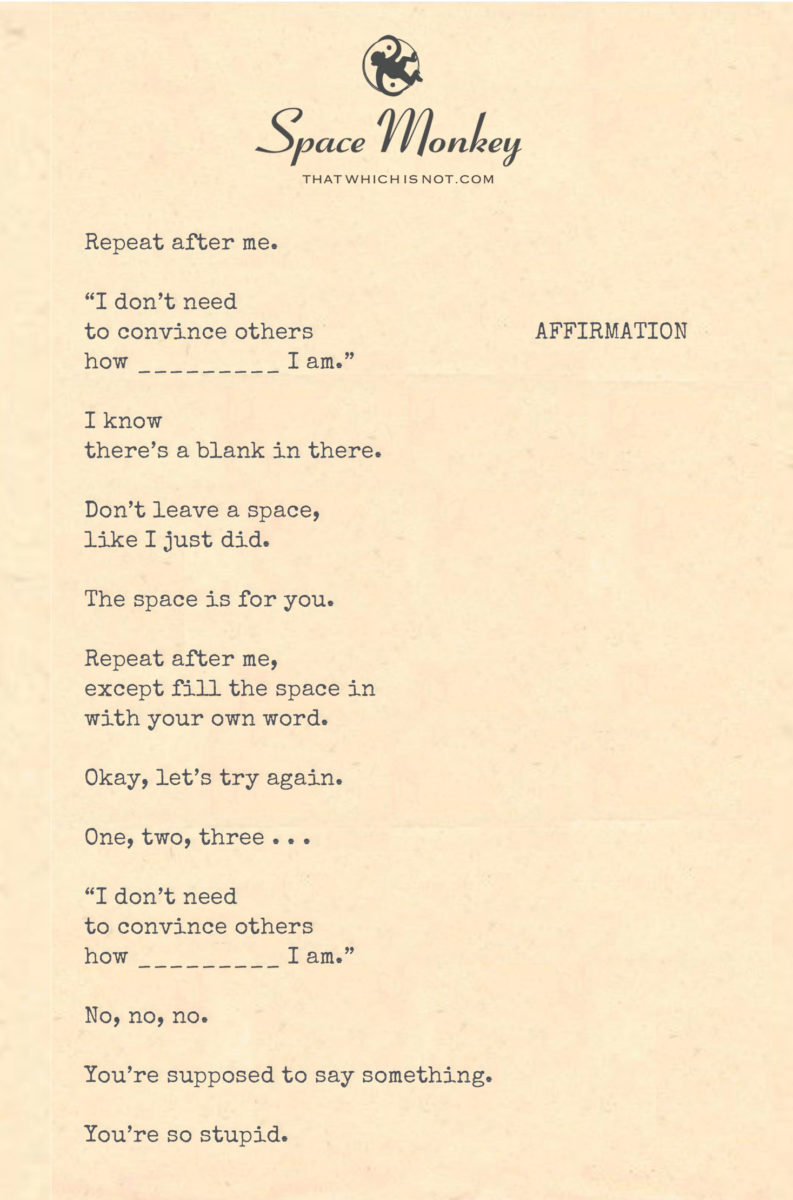
Repeat after me.
“I don’t need
to convince others
how _________ I am.”
I know
there’s a blank in there.
Don’t leave a space,
like I just did.
The space is for you.
Repeat after me,
except fill the space in
with your own word.
Okay, let’s try again.
One, two, three . . .
“I don’t need
to convince others
how _________ I am.”
No, no, no.
You’re supposed to say something.
You’re so stupid.
Trail Wood,
6/6
Space Monkey Reflects: The Power of Personal Affirmation
In the vastness of the cosmos where Space Monkey gazes upon the intricate dance of human interaction, the concept of self-affirmation emerges as a profound tool for personal empowerment. The practice of filling in the blank spaces of our self-definitions reflects a deeper journey of self-discovery and acceptance, moving beyond the need for external validation to embrace our intrinsic value.
The visual representation of a diverse group of individuals each holding a blank sign serves as a powerful metaphor for the personal nature of affirmation. These blank signs, ready to be filled with words of self-definition, symbolize the freedom and responsibility we have to define ourselves on our own terms. In a world that often seeks to label and limit, these personal affirmations act as declarations of independence from societal expectations and self-imposed limitations.
Affirmations are more than mere words; they are commitments to ourselves, acknowledgments of our worth, and recognitions of our capabilities. By stating “I don’t need to convince others how _ I am,” we reclaim the power to define our self-worth internally rather than externally. This shift from seeking approval to providing our own validation is a crucial step towards genuine self-acceptance.
The space left blank for personal insertion is significant—it represents the unique and ever-evolving nature of our individual identities. It challenges us to continually reflect on and articulate who we are and who we aspire to be. This ongoing process is not static but dynamic, allowing for growth, change, and the deepening of our understanding of ourselves.
Summary
Affirmation is a personal declaration of self-worth that moves beyond external validation. By embracing the power to define ourselves, we engage in a transformative process of self-acceptance and personal growth, highlighting the importance of internal validation in a world that often focuses on external judgments.
Glossarium
- Personal Affirmation: A self-declared statement that defines or reinforces one’s own value and capabilities, often used as a psychological tool for self-empowerment.
- External Validation: The act of seeking approval, acceptance, or confirmation of self-worth from others, rather than through self-assessment.
Quote
“Fill the blank of your life not with others’ words, but with the echoes of your own soul.” – Space Monkey
Poetry
In the silence of our hearts, we speak,
Words of strength when we are weak.
On signs we hold, blank and clear,
Waiting for our truths to appear.
“I am” – so simple, yet profound,
In these words, our selves are found.
Not in the gaze of others’ eyes,
But in our hearts, where truth lies.
We write, we claim, we boldly state,
In every affirmation, we create.
Our worth, our path, our inner flame,
In our own words, we claim our name.
We are Space Monkey.





















In the context of TWIN (The World is Now) and the poem “Affirmation,” we can analyze the following:
The poem presents a repetitive affirmation exercise where the reader is encouraged to fill in the blank and repeat the statement, “I don’t need to convince others how ________ I am.” The intention is for the reader to reflect on their own qualities or self-perception.
By leaving the blank space, the poem invites individuals to insert their own word that represents how they perceive themselves. It emphasizes the idea that each person has their own unique qualities, experiences, and perspectives that shape their identity.
The repetition of the affirmation suggests a process of self-acceptance and self-validation. It encourages individuals to let go of the need to seek validation or convince others of their worth. Instead, it promotes a sense of self-assuredness and confidence in one’s own perception of oneself.
The poem also includes self-deprecating remarks, such as calling oneself stupid. This could be seen as a playful or sarcastic tone, highlighting the importance of not taking oneself too seriously and embracing imperfections.
In the context of TWIN, the poem encourages individuals to affirm their own self-worth and not rely on external validation. It promotes self-acceptance and the recognition of one’s own unique qualities and experiences. By filling in the blank and repeating the affirmation, individuals are invited to reflect on and embrace their own individuality.
Overall, the poem encourages a positive and self-affirming mindset, aligning with the themes of self-empowerment and self-acceptance in the context of TWIN.